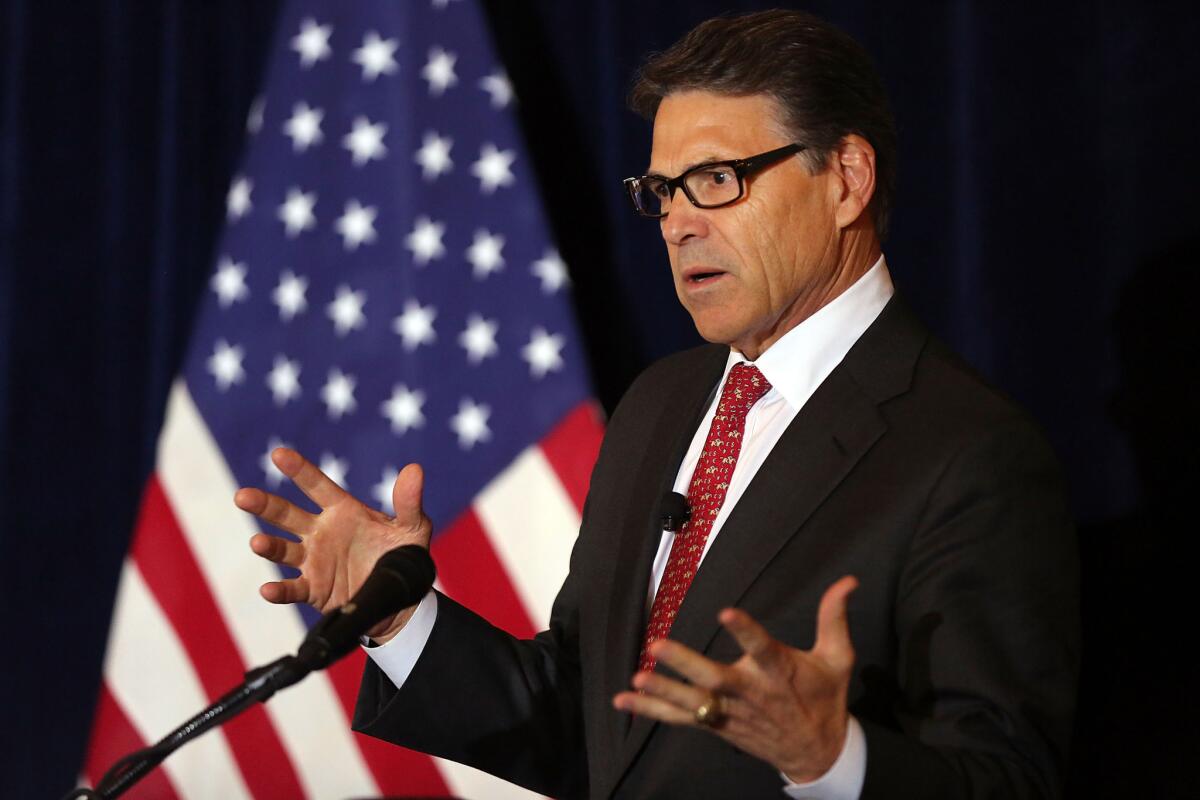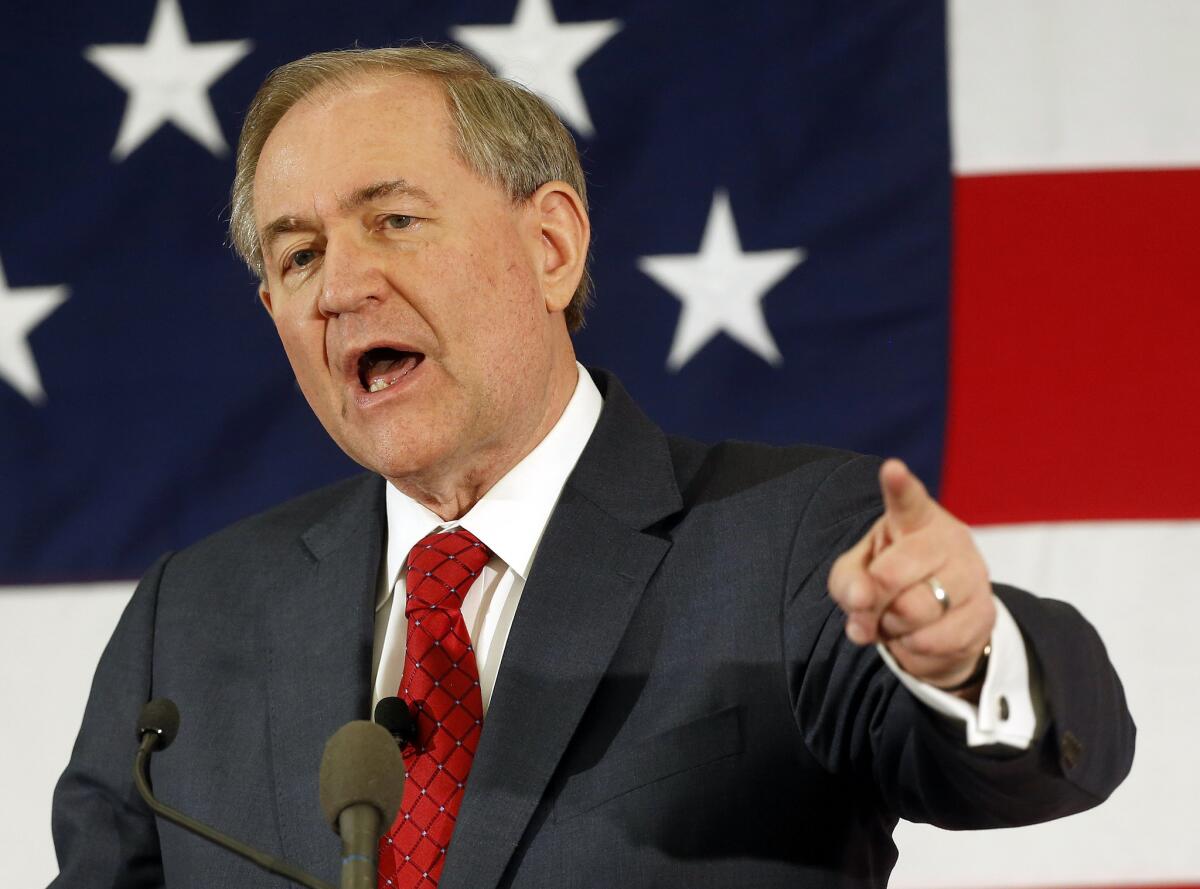What happens when Donald Trump is treated like any other candidate?
By the numbers
Welcome to Trail Guide, your daily tour along the twists and turns of the 2016 presidential campaign. It's Wednesday, July 29, and this is what we're watching:
- News outlets are taking Donald Trump seriously and digging into his past
- Hillary Rodham Clinton has toned down her defense of Planned Parenthood, calling the videos 'disturbing'
- Rand Paul is still struggling to reboot his campaign
- Donald Trump says he'd consider giving Sarah Palin a post in his administration
- Clinton won't say where she stands on the Keystone pipeline, but her critics have plenty to say about her silence
- Rick Perry addressed Wall Street Wednesday, largely attacking Clinton and Dems
- Top-tier Republicans will make the pilgrimage to a Southern California resort this weekend to court the Koch brothers
- In Miami on Friday , Clinton will call for end to Cuban embargo
Clinton call to end Cuba embargo comes as politics shift in Florida
Hillary Rodham Clinton's trip to Florida to call for an end to the Cuban embargo is not about making news. She advocated such a change a year ago, before becoming a formal candidate. Rather, it's an effort to put some of her GOP rivals on the spot in a key state, where the politics of the issue are shifting.
A few campaigns ago, calling for an end to the embargo would have been a major liability in Florida, with its large, ardently anti-Castro Cuban community.
But Florida and Cuban Americans in Florida have changed.
As The Times' Lisa Mascaro wrote earlier this year, "a younger generation born in the United States hears the story line handed down from their parents and grandparents, but it's not a hardship they personally endured.
Polling shows that Cuban Americans are almost equally divided on U.S. policy toward Cuba, a shift from just a generation ago when only 13% favored normalizing relations. The number of Cuban Americans identifying as Democrats doubled over the decade, to 44%, according to the Pew Research Center, and those calling themselves Republicans dropped below 50%."
Meanwhile, the state's Latino population is diversifying, noted The Times' David Lauter and Mark Z. Barabak.
"Cubans are now only one element among Florida's increasingly diverse Latinos, many of whom care little about Cuban politics. Many political analysts are convinced that President Obama's Cuba policy will not be decisive in the battle for the nation's third-largest state in 2016. At worst, they think, it will be a neutral factor."
Still, two top GOP candidates from Florida were the first two to respond to Clinton's proposal today, signaling they planned to try to use it against her when possible.
A spokesman for former Florida Gov. Jeb Bush accused Clinton on Wednesday of “putting political expediency ahead of doing what's right,” noting she had opposed easing restrictions against Cuba in her 2000 Senate and 2008 presidential campaigns. Bush has said that Obama's plans to normalize relations between the former Cold War adversaries “undermines the quest for a free and democratic Cuba.”
In a separate statement, Sen. Marco Rubio (R-Fla.) sought to equate what he called Clinton's “reset” with Cuba to what he called the “failed reset” with Russia, referring to one of her early initiatives as secretary of State.
“Unilateral concessions to the Castros will only strengthen a brutal, anti-American regime 90 miles from our shore,” he said. “President Obama and Secretary Clinton must learn that appeasement only emboldens dictators and repressive governments, and weakens America's global standing in the 21st century.”
Rubio said he would support ending the embargo only if it was “accompanied by real democratic reform."
A Gallup survey from February found that 59% of respondents favored ending the trade embargo against Cuba while 29% opposed it.
Doing so requires the support of Congress, which appears a heavy lift, particularly with Republicans in control of both chambers.
Rick Perry's Wall Street speech largely focuses on proposals by Hillary Clinton, Democrats

NEW YORK, NY - JULY 29: Former Texas Governor and Republican presidential candidate Rick Perry speaks at the Yale Club on July 29, 2015 in New York City. The GOP presidential candidate gave a talk to a lunch crowd on what his economic policies are and his vision for Wall Street reform. Perry’s economic proposals are to the left of many of the other GOP presidential candidates. (Photo by Spencer Platt/Getty Images) ** OUTS - ELSENT, FPG - OUTS * NM, PH, VA if sourced by CT, LA or MoD **
Former Texas Gov. Rick Perry focused on Wall Street on Wednesday in his bid to win the Republican nomination for president, condemning Hillary Rodham Clinton's economic agenda and vowing to roll back the 2010 Dodd-Frank financial regulation legislation.
Perry is making his second run for the White House after a failed 2012 bid.
In recent weeks, his candidacy has largely hinged on criticizing inflammatory rhetoric by Donald Trump about Sen. John McCain's war record.
But Trump was absent from Perry's speech Wednesday, which focused mostly on Clinton and other Democrats.
He said her plan to nearly double the capital gains tax for high earners would “kill” economic growth, and he touted the jobs created in Texas during the 14 years he was governor.
Some keys to Perry's proposal, in his words:
On digital currency: “We should create regulatory breathing room for banking with digital currencies, like Bitcoin. Digital currencies harbor the possibility of reducing the cost and improving the quality of financial transactions in much the same way that the conventional Internet has done for consumer goods and services.”
On corporate taxes: “We need to significantly lower corporate rates to bring jobs and investment back onshore, and to lift wages for workers. We need to dramatically cut taxes for businesses of all sizes. And we need to cut taxes on individuals and families.”
On energy: “As America emerges as the leading energy power of the 21st century, we must legalize the export of our oil and natural gas.”
Jim Gilmore, former Virginia governor, running for president

FILE - In this April 17, 2015, file photo, former Virginia Gov. Jim Gilmore speaks at a Republican Leadership Summit in Nashua, N.H. The Republican presidential contest has grown to 17 candidates with the July 29 entry of Jim Gilmore as he files the necessary paperwork with the Federal Election Commission.. (AP Photo/Jim Cole, File)
The Republican presidential contest has grown to 17 candidates with Wednesday's entry of Jim Gilmore.
The former Virginia governor told the Associated Press earlier this month that he would announce his candidacy in early August. On Wednesday, he filed the necessary paperwork with the Federal Election Commission.
Gilmore, a former Army intelligence officer, completed one term as governor in 2002.
Who else is running for president in 2016?
Vetting Trump: Breast pumps, bullying and branding
It wasn't so long ago (12 days) when the Huffington Post declared that it considered Donald Trump's candidacy to be entertainment, not news, and would publish his coverage on its website accordingly.
Now the trend appears to have shifted in the other direction, with established news outlets deciding to treat Trump as they would other candidates for office.
Several big stories over the past few days seem to have arisen out of what might be considered a political journalism tradition: the vet.
The New York Times dug up an old deposition for this story about Trump's trouble with accuracy and, apparently, with breast pumps.
The Washington Post took a close look at exactly how Trump makes millions even when his property fails — through licensing his brand.
Bloomberg did the number-crunching on Trump's public financial disclosure and found the candidate's claims are about $7 billion higher than its analysis.
This CNN piece examines Trump's shifting policy positions, noting his previous support for a single-payer health system, his previous self-identification as a Democrat and his erstwhile high praise for Hillary Clinton.
Even the Daily Beast story this week quoting Trump lawyer Michael Cohen's misguided notions of rape and marriage and his threats to ruin a reporter seems to have begun as a more traditional vetting piece. The reporters read through a biography of the candidate and re-litigated an old, little-known allegation.
The portrait that is emerging from these stories is every bit as colorful and nontraditional as the candidate. It's pretty hard to imagine any other candidate deciding to counter a charge in a story with this kind of Twitter spree:
But it's not yet clear that the revelations are damaging enough to take the air out of Trump's campaign, as some in the Republican establishment hope.
Hillary Clinton will call for end to Cuban embargo
GOP candidates to visit Southern California for Koch brothers event
Several top-tier Republican presidential candidates will travel to Southern California this weekend for a gathering hosted by a nonprofit with close ties to the billionaire brothers Charles and David Koch.
Freedom Partners, the Arlington, Va.-based nonprofit, will hold a two-day event that brings together entrepreneurs and philanthropists and allows candidates to mingle with potential donors.
Former Florida Gov. Jeb Bush, Wisconsin Gov. Scott Walker and Sens. Ted Cruz of Texas and Marco Rubio of Florida will be in attendance. The event takes place days before most of them will travel to Cleveland for the first Republican presidential debate on Aug. 6.
Freedom Partners is bankrolled by the Koch brothers, whose network has reportedly vowed to spend nearly $1 billion to elect a Republican to the White House in 2016. The group hosted a similar event earlier this year in Rancho Mirage.
This weekend the candidates will sit for 25-minute question-and-answer sessions.
Also in attendance will be former Hewlett-Packard CEO Carly Fiorina, the lone woman in the crowded Republican field. She is polling toward the bottom of the pack and is unlikely to be on the prime time debate stage next week.
Donald Trump a smashing hit in Mexico

Donald Trump piñatas sell at Tijuana’s Hidalgo Market for $12 to $18, depending on the quality and details.
Donald Trump's papier-mache likeness sells for $12 to $18 in Tijuana, depending on the quality and details. The piñatas typically feature a sweep of blond hair and a mouth frozen open.
Clinton says Planned Parenthood videos 'disturbing,' raise questions about tissue donation
Hillary Rodham Clinton offered a less-than-vigorous defense of Planned Parenthood in an interview published Wednesday in the New Hampshire Union Leader.
“I have seen pictures from them and obviously find them disturbing,” Clinton told the paper in a one-on-one interview.
Planned Parenthood is fighting charges that it profits from the sale of fetal tissue for research. The debate was sparked by a series of undercover videos recorded by an anti-abortion group that appeared to show employees speaking graphically about tissue from aborted fetuses. The third video, recorded by the Center for Medical Progress, was released Wednesday.
Congressional Republicans have called for an investigation and announced they will vote on a measure to defund Planned Parenthood, which performs abortions among other women's health services in clinics across the country.
The group's leadership has said it is the target of a smear campaign, while some Democrats have asked the Justice Department to look into whether the Center for Medical Progress broke the law in its secret taping operation.
Clinton, who supports abortion rights, has previously described the videos as part of pattern of "concerted attacks" on the group. But she took a milder tone on Tuesday, nearly conceding that the concerns about tissue donation were warranted.
“Planned Parenthood is answering questions and will continue to answer questions. I think there are two points to make,” Clinton told the newspaper. “One, Planned Parenthood for more than a century has done a lot of really good work for women: cancer screenings, family planning, all kinds of health services. And this raises not questions about Planned Parenthood so much as it raises questions about the whole process, that is, not just involving Planned Parenthood, but many institutions in our country.”
Rand Paul's reboot appears glitchy
The Times' Lisa Mascaro reported earlier this month on the Rand Paul campaign's attempt to recapture its mojo by returning to the Kentucky senator's libertarian roots. But the shift in emphasis doesn't appear to be doing the trick.
Politico reports that morale is low and frustration is high inside the Paul camp. The candidate has been reluctant to hustle for needed cash, unnamed sources said, as evidenced by his plans to skip a confab of conservative donors, hosted by the Koch brothers, in Southern California this week.
There's trouble outside the campaign, too, the Washington Post reports Wednesday.
"Last fall, Time magazine dubbed Paul 'the most interesting man in politics.' But it has been a year since he led a national poll and months since he led in New Hampshire, a state where his father made strong stands in two presidential campaigns," the Post's David Weigel writes.
It is July, of course. And it is undeniably Donald Trump's July. None of the 16 GOP candidates is having much luck stealing attention from Trump. Still, the high expectations for Paul make his sluggish performance especially notable.
The Paul campaign says it's playing the long game -- a slow-and-steady strategy designed to peel off just enough support to stay alive in a crowded race. As Mascaro noted, "Paul's campaign is betting it's better to be loved by a few than liked by many, particularly in a fractured field."
Others seem to have adopted that strategy, too, however. Raising the question: Which Republican(s) will be poised to stage a "comeback" if and when the race enters the post-Trump phase?
Clinton's silence on Keystone filled by criticism from left and right
Hillary Rodham Clinton this week repeated her plans to keep quiet about where she stands on approval of the Keystone XL pipeline. Clinton says she's waiting for the State Department's formal review process to finish. It would inappropriate for her to weigh in on a process that began during her tenure as secretary of State, she argues.
Keeping quiet means Clinton is going to take some heat from both sides. The issue is an important one for environmentalists looking to see how committed Clinton is to curbing fossil fuels, and a hot one for Republicans who sell the project as a job creator.
On Tuesday, Clinton caught flak from her rivals for the Democratic nomination.
And from Republicans:
Of course, there's precedent for trying to take a pass on the issue.
President Obama, assisted by a long legal battle, has managed to avoid declaring his opinion, too. Clinton promised Tuesday to weigh in -- eventually.
If Obama has not resolved the issue, and "it's undecided when I'm elected president, I will answer your question," she said.
By the numbers
Start your day right
Sign up for Essential California for news, features and recommendations from the L.A. Times and beyond in your inbox six days a week.
You may occasionally receive promotional content from the Los Angeles Times.



